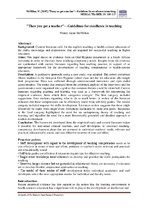| dc.contributor.author | McMillan, Wendy | |
| dc.date.accessioned | 2009-12-18T10:55:43Z | |
| dc.date.available | 2009-12-18T10:55:43Z | |
| dc.date.issued | 2007 | |
| dc.identifier.citation | McMillan, W. (2007) "Then you get a teacher" - Guidelines for excellence in teaching. Medical Teacher, 29:e209 - e218 | en_US |
| dc.identifier.uri | http://hdl.handle.net/10566/84 | |
| dc.description.abstract | Background: Current literature calls for the explicit teaching to health-science educators of the skills, knowledge and dispositions
that are required for successful teaching in higher education.
Aims: This paper draws on evidence from an Oral Hygiene department at a South African university in order to
illustrate these teaching-competency needs. Insights from the evidence are synthesised with current literature regarding best
teaching practice, in support of an appropriate framework for the development of teaching competencies to health-science
educators.
Description: A qualitative approach, using a case study, was adopted. The cohort comprised fifteen students in the first-year Oral
Hygiene cohort class and the ten educators who taught their programme. Data was collected through semistructured interviews
and open-ended questionnaires. The topics that emerged from the combined analysis of the interviews and the questionnaires
were organised into a grid so that common themes could be identified. Current literature regarding teaching and learning was used
as a framework for interpreting the empirical evidence, from which three categories emerged. The first category included
suggestions from students regarding what to do to teach better. A review of the literature indicates that these competencies can be
effectively learnt from self-help guides. The second category included requests for skills development. Literature review suggests
that these might effectively be learnt from single-event workshops facilitated by more able peers. Responses in the final category
highlighted the need for an underpinning theory of teaching and learning, and signalled the need for a more theoretically
grounded and detailed approach to teacher development.
Conclusion: The framework developed from the empirical study and current literature makes it possible for individual clinical
teachers, and staff developers, to construct teaching-competency development plans that are pertinent to individual teachers’
needs, relevant and practical, educationally sound, and cost-effective in terms of time and effort. | en_US |
| dc.language.iso | en | en_US |
| dc.publisher | Routledge | en_US |
| dc.rights | This file may be freely used provided that the source is acknowledged. No commercial distribution of this text is permitted. | |
| dc.source.uri | http://dx.doi.org/10.1080/01421590701478264 | |
| dc.subject | Health sciences education | en_US |
| dc.subject | Teacher development | en_US |
| dc.subject | Teaching competences | en_US |
| dc.subject.lcsh | College teaching | |
| dc.title | "Then you get a teacher" - Guidelines for excellence in teaching | en_US |
| dc.type | Article | en_US |

